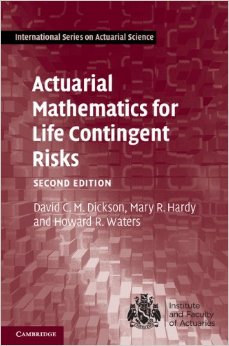Course syllabus
More details of course syllabus can be found here.
Required background
STT 455 (Actuarial Models I)
Course textbook
 Actuarial Mathematics for Life Contingent Risks, 2nd edition, by D. Dickson, M. Hardy, and H. Waters, Cambridge University Press, 2013.
Actuarial Mathematics for Life Contingent Risks, 2nd edition, by D. Dickson, M. Hardy, and H. Waters, Cambridge University Press, 2013.
Solutions manual to the 2nd edition can also be ordered here: amazon.com.
In addition, the Cambridge University Press site may provide additional resources here: Cambridge University Press.
Any possible errata on the book can usually be found here.
(Picture file of textbook was downloaded from the Cambridge University Press website.)
Course assessments
Please mark your calendar for the following course assessments:
| Homework | 15% | February 4 |
| Class Test 1 | 25% | February 25 |
| Class Test 2 | 25% | April 8 |
| Final Examination | 35% | May 4, Monday 3:00-5:00 pm |
Final examination
Final assessment week for Spring 2015 takes place from Monday, May 4 through Friday, May 82. Students are required to be available for their exam and/or complete an assessment during the time and schedule stated in the Office of the Registrar (RO). For more information on Final Examination Policy, please go to here.
Class attendance
While attendance is not compulsory, it will be checked randomly throughout the semester and students with excellent record of attendance may be rewarded. If necessary, students who are doing poorly in the class with poor record of attendance will be warned.
Academic honesty
The standards of academic honesty as stated in the Student Handbook will be strictly enforced. Please feel free to collaborate with others on homework; this is the best way to learn. However, write up solutions as your own - do not copy the work of others. You should be able to understand and replicate all that you have written as homework.
Religious observance guidelines
From the Office of the Provost:
"It bears remembering that it has always been the policy of the University to permit students and faculty/academic staff to observe those holidays set aside by their chosen religious faith. Faculty and staff should be sensitive to the observance of these holidays so that students who absent themselves from class on these days are not disadvantaged. It is the responsibility of those students who wish to be absent to make arrangements in advance with their instructors. Without another simple and dignified way to determine the validity of individual claims, the claim of a religious conflict should be accepted at face value. Please consider the ways in which these planned absences can be fairly and respectfully accommodated. As an institution, we are committed to the value of inclusion, and so our practices must conform to our commitments. I am confident that working together we can continue to build an environment that supports and fosters diversity and inclusiveness.''
Additional information on MSU's Religious Observance policy can be found on the website of the Office of Inclusion and Intercultural Initiatives and the Office of the Registrar.